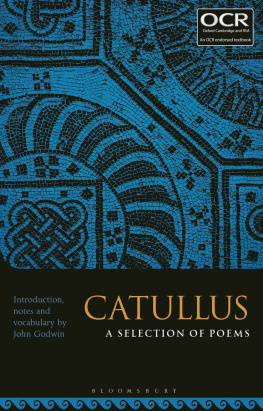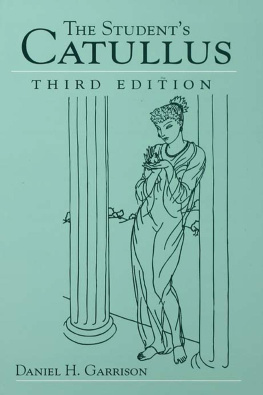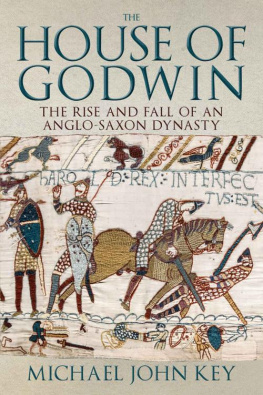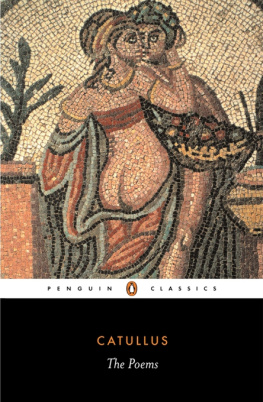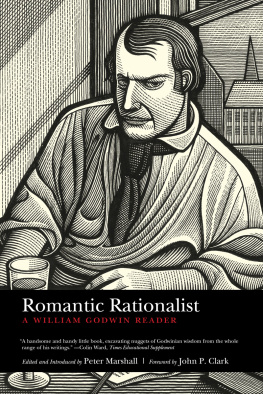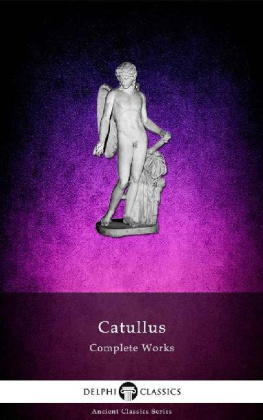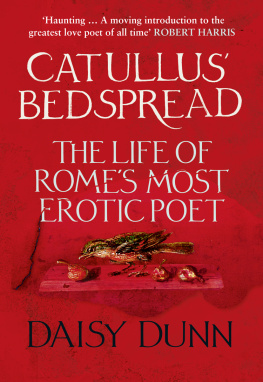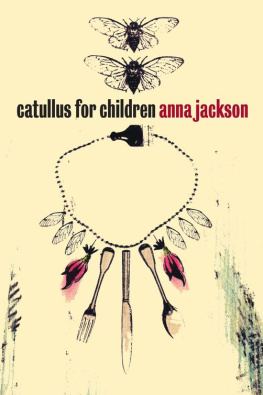John Godwin - Catullus: A Selection of Poems
Here you can read online John Godwin - Catullus: A Selection of Poems full text of the book (entire story) in english for free. Download pdf and epub, get meaning, cover and reviews about this ebook. year: 2019, publisher: Bloomsbury, genre: Detective and thriller. Description of the work, (preface) as well as reviews are available. Best literature library LitArk.com created for fans of good reading and offers a wide selection of genres:
Romance novel
Science fiction
Adventure
Detective
Science
History
Home and family
Prose
Art
Politics
Computer
Non-fiction
Religion
Business
Children
Humor
Choose a favorite category and find really read worthwhile books. Enjoy immersion in the world of imagination, feel the emotions of the characters or learn something new for yourself, make an fascinating discovery.
- Book:Catullus: A Selection of Poems
- Author:
- Publisher:Bloomsbury
- Genre:
- Year:2019
- Rating:4 / 5
- Favourites:Add to favourites
- Your mark:
- 80
- 1
- 2
- 3
- 4
- 5
Catullus: A Selection of Poems: summary, description and annotation
We offer to read an annotation, description, summary or preface (depends on what the author of the book "Catullus: A Selection of Poems" wrote himself). If you haven't found the necessary information about the book — write in the comments, we will try to find it.
Catullus: A Selection of Poems — read online for free the complete book (whole text) full work
Below is the text of the book, divided by pages. System saving the place of the last page read, allows you to conveniently read the book "Catullus: A Selection of Poems" online for free, without having to search again every time where you left off. Put a bookmark, and you can go to the page where you finished reading at any time.
Font size:
Interval:
Bookmark:

The following titles are available from Bloomsbury for the OCR specifications in Latin and Greek for examinations from June 2021 to June 2023
Catullus: A Selection of Poems, with introduction, commentary notes and vocabulary by John Godwin
CiceroPro Cluentio: A Selection, with introduction, commentary notes and vocabulary by Matthew Barr
LivyHistory of RomeI: A Selection, with introduction, commentary notes and vocabulary by John Storey
OvidHeroides: A Selection, with introduction, commentary notes and vocabulary by Christina Tsaknaki
TacitusAnnalsIV: A Selection, with introduction, commentary notes and vocabulary by Robert Cromarty
VirgilAeneidXII: A Selection, with introduction, commentary notes and vocabulary by James Burbidge
OCR Anthology for Classical Greek AS and A Level, covering the prescribed texts by Aristophanes, Homer, Plato, Plutarch, Sophocles and Thucydides, with introduction, commentary notes and vocabulary by Simon Allcock, Sam Baddeley, John Claughton, Alastair Harden, Sarah Harden, Carl Hope and Jo Lashly
Supplementary resources for these volumes can be found at www.bloomsbury.com/OCR-editions-2021-2023
Please type the URL into your web browser and follow the instructions to access the Companion Website. If you experience any problems, please contact Bloomsbury at academicwebsite@bloomsbury.com

The teaching content of this resource is endorsed by OCR for use with specification AS Level Latin (H043) and specification A Level Latin (H443). In order to gain OCR endorsement, this resource has been reviewed against OCRs endorsement criteria.
This resource was designed using the most up to date information from the specification. Specifications are updated over time which means there may be contradictions between the resource and the specification, therefore please use the information on the latest specification and Sample Assessment Materials at all times when ensuring students are fully prepared for their assessments.
Any references to assessment and/or assessment preparation are the publishers interpretation of the specification requirements and are not endorsed by OCR. OCR recommends that teachers consider using a range of teaching and learning resources in preparing learners for assessment, based on their own professional judgement for their students needs. OCR has not paid for the production of this resource, nor does OCR receive any royalties from its sale. For more information about the endorsement process, please visit the OCR website, www.ocr.org.uk.
The text and notes found in this volume are designed to guide any student who has mastered Latin up to GCSE level and wishes to read Catullus in the original.
The book, however, is particularly designed to support students who are reading Catullus text in preparation for OCRs AS/A Level Latin examination in June 2022 and June 2023. (Please note that this edition uses AS to refer indiscriminately both to AS itself and the first year of A Level, i.e. Group 3.)
This edition contains a detailed introduction to the historical and literary context of the poetry. The Commentary Notes to the text aim to help students to bridge the gap between GCSE and A Level Latin, and therefore focus on the harder points of grammar and word order as well as highlighting the literary and historical points of interest and making reference to other texts which are relevant to the poetry. I am aware that this book straddles both years of the A Level course, and so I have tried to write something which could be understood by a student fresh from GCSE while also giving something to students who are intending to pursue the subject to a higher level at university. At the end of the book is a full vocabulary list for all the words contained in the prescribed sections, with words in OCRs Defined Vocabulary List for AS Level Latin flagged by means of an asterisk.
My thanks are due above all to Alice Wright and her team at Bloomsbury, who have once again been a model of efficiency and enthusiasm. My thanks also go to Professor Susan Treggiari of Brasenose College, Oxford, for her expert help with the background to poem 62. I owe a huge debt of gratitude to Professor Stephen Heyworth of Wadham College, Oxford, to Dr Gail Trimble of Trinity College, Oxford, as well as to the anonymous OCR reader, who have all read this book, in whole or in part, and made many highly useful comments which saved me from error and pointed me towards a better reading of the text.
John Godwin
Shrewsbury, 2018
Little is known about the life of Gaius Valerius Catullus. We are reasonably certain that his family must have been wealthy if only because he clearly had such a good education at a time when education was not free and we know also that his family came from Verona, a place he refers to in his poems (e.g. 68.27). He is recorded by St Jerome as living to the age of thirty, and Ovid (Amores III.9.61) tells us that he died young; and since there are no references in his poems to anything after 55 BC it is tempting to suggest that he was born in 84 BC and died in 54 BC . He seems to have climbed the ladder of political success (or at least scaled the lower rungs, as he mentions in poem 10 being on the staff of the praetor Gaius Memmius when he was governor of Bithynia in 5756 BC ) and he shows some interest in the personalities of the era such as Pompey, Caesar, Cicero and Clodius. The age he lived in was one of political upheaval as the old Roman Republic, in which competing aristocrats controlled the Senate and People of Rome, began to suffer body blows from the rising class of generals (who commanded the armies) and the orators (who swayed the law courts). The influx of slaves into Italy in the second century BC had led to a growing urban plebs, as smallholders sold their land and moved into the city. Caius Marius (15786 BC ) as consul and general had removed the property qualification required for military service and enlisted poor men into the legions in 106 BC ; and ever since then, the troops had owed their loyalty to their general rather than to the state. This process of separating the military from the judicial and political power centres led swiftly to the dictatorship of Sulla (8279 BC ) and ultimately to the principate from 27 BC onwards. The exercise of power by army commanders generated mistrust, fear, anger and increased violence in the city anger which is reflected in some of the poems of Catullus. He is, for instance, crudely insulting towards Pompey the Great (29), Julius Caesar (29, 54, 57, 93) and especially their henchman Mamurra (29, 94, 105, 114, 115). When Catullus fell foul of Julius Caesar, however, the great man forgave him and invited him to dinner (Suetonius Julius Caesar 73). The political engagement which we find in later poets such as Horace was a later phenomenon, born as he was into an age where the poet could enact the role of a prophetic voice (vates) and both reflect and possibly influence perceptions of political life. Catullus poetry is closer to the simplicitas or outspoken bluntness which Romans enjoyed, a bluntness employed and enjoyed by earlier satirists such as Lucilius.
Catullus enjoys mocking his contemporaries such as Gellius, Furius, Aurelius, Varus, Piso whom we can try to identify from other sources, along with others who elude identification, such as the hapless cuckold in 17. Flavius in poem 6 and Varus in 10 are mocked for their girlfriends, while Gellius is abused roundly for a catalogue of bad behaviour in poems 8891. Other targets fare even worse in poems not included in this selection: the vilified girl Ameana, whose physical failings are listed, one by one, in poem 43, or the foul tart with the face of a dog from Gaul, who has taken his writing tablets and refuses to return them in poem 42. Catullus poems convey a power which can be directed for good or for ill, and he uses his verses as missiles more than once, such as in poem 40 where Ravidus is facing a firing squad of iambic lines. He is quick to mock others for (e.g.) their misuse of the letter h (84), their bizarre dental hygiene (39), their choice of girlfriend (41 and also 6), their austere way of living (23), their disgusting lack of hygiene (97) and their sexual habits (poems 8891). Catullus does not except himself from the mockery, of course, and shows himself in a far from flattering light when he attempts unsuccessfully to impress a girl in poem 10 or when he pleads with himself to stop loving a girl who clearly has stopped loving him (8, 11, 76). His poems show him as a lover who is randy (32), madly in love (51), romantic (5), disillusioned with his love affair (76) and even stuck with both love and hatred for the same person (85). We also see him playful with his friends (50), enthralled by a handsome young man (48) and bitterly jealous of anyone who tries to steal the youth from him (81).
Next pageFont size:
Interval:
Bookmark:
Similar books «Catullus: A Selection of Poems»
Look at similar books to Catullus: A Selection of Poems. We have selected literature similar in name and meaning in the hope of providing readers with more options to find new, interesting, not yet read works.
Discussion, reviews of the book Catullus: A Selection of Poems and just readers' own opinions. Leave your comments, write what you think about the work, its meaning or the main characters. Specify what exactly you liked and what you didn't like, and why you think so.

